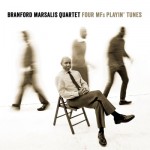It’s been roughly 100 years since the uniquely American music that came to be known as jazz was being codified on the streets of New Orleans. This music has shown a remarkable ability to adapt to changing times, evolve into different forms and eventually migrate to all parts of the globe. It also has such malleability that cultural historians have been arguing about how to name it for more than half of its lifetime. Branford Marsalis, always a glib thinker, doesn’t quibble about nomenclature. In his refreshingly direct manner, Marsalis titled his new album Four MF’s Playin’ Tunes.
The music has produced an unending string of virtuoso players, which creates its own dilemma. No matter how well you play your instrument(s), someone else out there is as good or better, so becoming top dog is not only about technique and chops but about intangibles like vision, attitude and emotional depth. One of the things that set Marsalis apart is his fearless attitude, his willingness to let the music carry him wherever it will. If he had only taken his diploma from the Art Blakey and the Jazz Messengers College of hard bop and led his quartet, he would almost certainly be a lesser figure than he is today. But Marsalis pushed his music into unfamiliar, some would say unworthy, areas— joining Sting’s band, taking over the musical director’s chair for the Tonight Show, jamming with the Grateful Dead and forming the hybrid band Buckshot LeFonque.
Meanwhile he worked hard at both composition and concept. On one hand he’s developed an ambitious program to play with European-style “classical” orchestras; on the other he’s taken on the legacy of John Coltrane, performing his version of American classical music by recording A Love Supreme. He ran the Columbia Jazz A&R department long enough to sign the brilliant saxophonist David S. Ware, but stayed only long enough to realize the only label he could work with was his own. Accordingly, he left and formed his own imprint, Marsalis Music.
In this larger context, Marsalis is able to treat his quartet as the sounding board for his ideals, the roots of a vision that encompasses a larger world. The quartet is a team that allows Marsalis freedom to be himself and at the same time rely on his peers to support and nourish his muse. Pianist Joey Calderazzo has been Branford’s right-hand man since the untimely death of the brilliant Kenny Kirkland 14 years ago. Calderazzo and Marsalis are coming off the wonderful duets album Songs of Mirth and they open up in similar fashion, with Calderazzo phrasing the theme to his own “The Mighty Sword.” Marsalis joins for a duet reiteration of theme before the rhythm section kicks the tune into high gear. Calderazzo also contributes the tone poem-like “As Summer Into Autumn Slips” later in the recording. Eric Revis chips in with a couple of his own tunes—the Eric Dolphy-like “Brews,” with fiery soprano sax soloing from Marsalis, and the beautiful “Maestra.” The quartet then moves to a brilliant recasting of Thelonious Monk’s “Teo,” with Calderazzo framing the melody with choice chords before Marsalis takes off on a tenor journey that works its way into a call-and-response with drummer Justin Faulkner. Faulkner is the newest addition to the group and he fits beautifully on his first studio session with the band.
Three of the tunes come from Branford’s fertile imagination— the fiery “Whiplash,” which showcases the front line’s soloing strength over a frenetic pulse from the rhythm section before Faulkner takes off on a climactic drum solo; “Endymion,” a merry tribute to the legendary Mid-City Mardi Gras parade featuring an excellent solo from Revis and a wild tenor burnout response from Marsalis; and “Treat It Gentle,” an Ellingtonesque “bonus” track after the band pulls out all the stops for a soulful set-closing rendition of the standard ballad “My Ideal,” a gorgeous theme that gets Branford’s best James Moody treatment and atmospheric solo turns from Calderazzo and Revis.
Taken at a full listening, the album is as satisfying as a great concert set. Which is exactly what you’d expect when these four MF’s get together to play some tunes.





